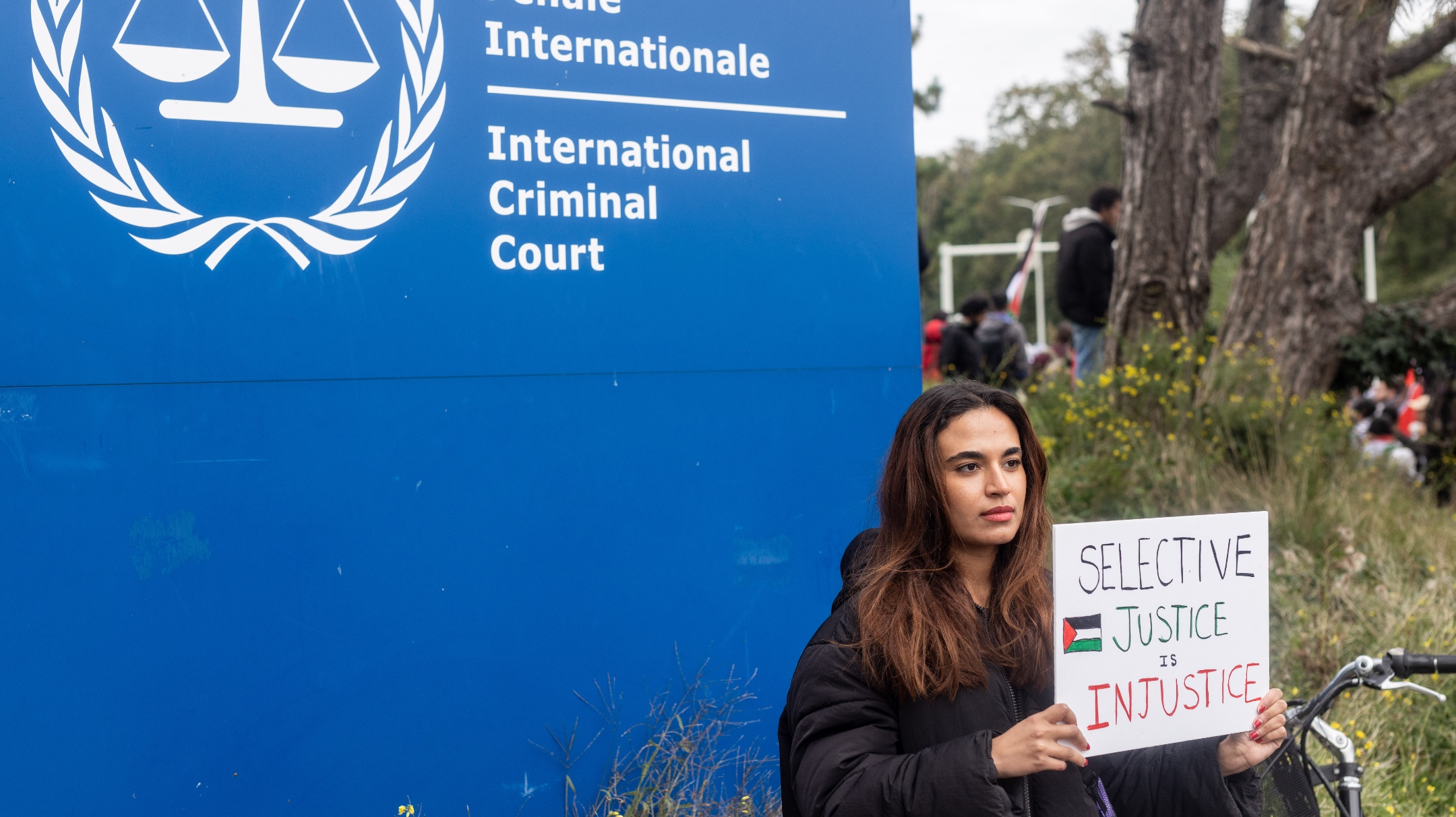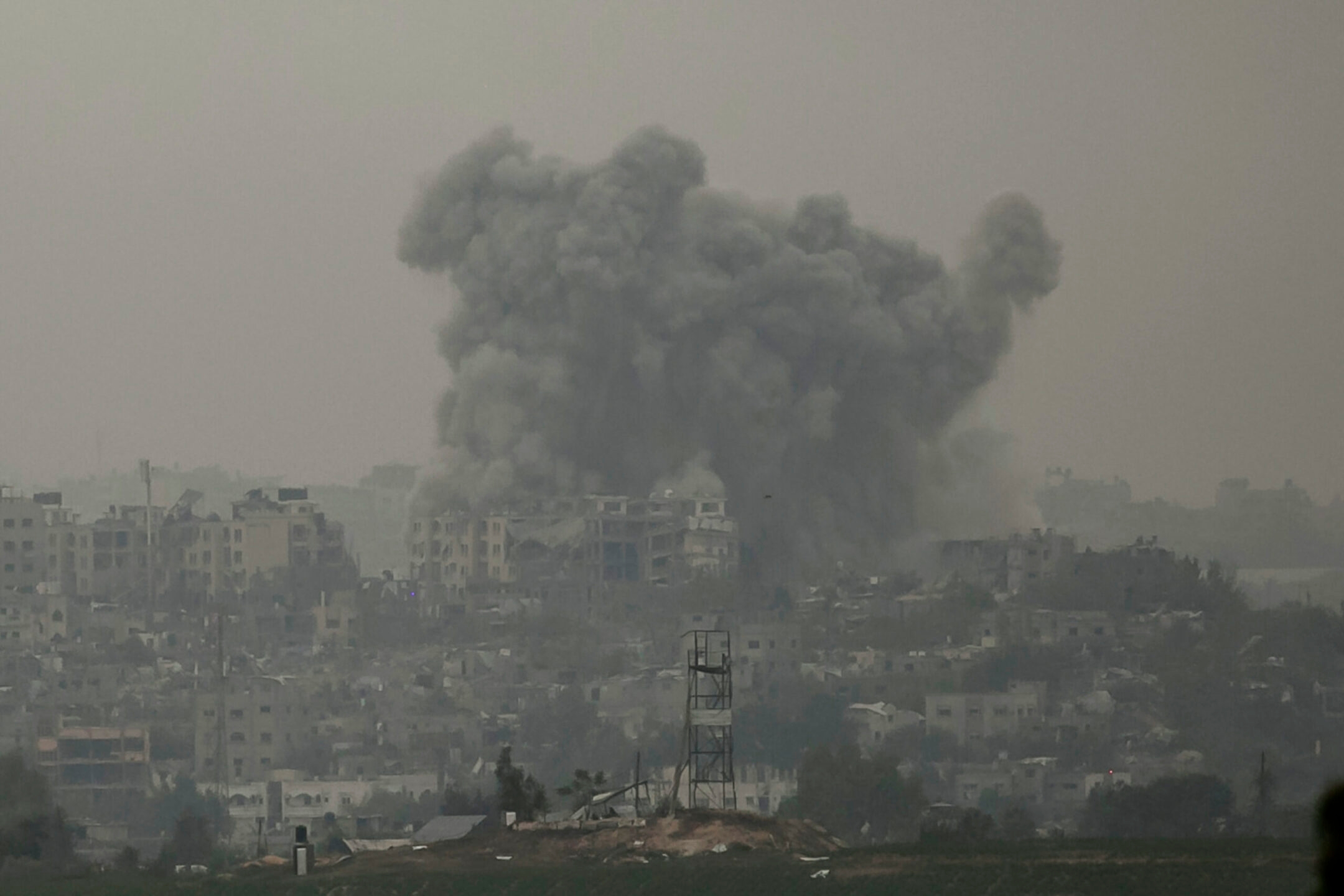Israel faces charges of genocide at the International Court of Justice. Here’s why, and how Israel will respond.
For the first time in decades, Israeli government lawyers will grapple with an allegation of genocide — as defendants and not as prosecutors

A pro-Palestinian demonstrator holds a sign that reads “Selective Justice is Injustice” during a pro-Palestinian demonstration in front of the International Criminal Court in The Hague, Oct. 18, 2023. (Roger Anis/Getty Images)
WASHINGTON (JTA) — Perhaps the most famous court case in Israel history was the trial of Adolf Eichmann, one of the architects of the Holocaust. Next week, more than 60 years later, lawyers for the Israeli government will again grapple with an allegation of genocide — but this time as defendants and not as prosecutors.
That grim history helps explain why Israel has chosen to engage with the International Court of Justice, which will weigh a claim by South Africa that Israel is committing genocide in its war against Hamas in Gaza. Israel is furious at the accusation, which it called a perversion of the genocide charge.
The ICJ will base its judgment on the 1948 U.N. Genocide Convention, which Israel joined almost as soon as the state was established because the convention was written in the wake of the Holocaust, in hopes of preventing another genocide.
“Israel decided to send a legal team because this is an outrageous application by South Africa and we will defend ourselves against those lies,” Lior Hayat, the spokesman for Israel’s Foreign Ministry, said in an interview.
Here’s what’s behind the accusation, how Israel is defending it and what to anticipate.
Who is adjudicating the accusation, and when?
The International Court of Justice, based in The Hague in the Netherlands, adjudicates claims against states. In the past it has considered disputes on everything from maritime border disputes to the United States’ funding of the Contras rebel groups in Nicaragua in the 1980s. The court, first convened in 1946, is the culmination of a series of international conferences that aimed to adjudicate disputes between nations as a means of preventing war.
The court has previously considered cases involving Israel’s treatment of the Palestinians, the moving of the U.S. embassy from Tel Aviv to Jerusalem and an incident in 1955 in which an El Al flight was shot down over Bulgarian airspace.
The International Criminal Court in the same city adjudicates criminal allegations against individuals, such as generals or notorious despots including Libya’s Muammar Ghaddafi and Russian President Vladimir Putin.
The case was initiated late last month by South Africa, and the first hearings are next week, Jan. 11 and 12.
Why is Israel participating?
Israel has a tradition of not engaging with war crimes accusations against its officials, in part because it is not party to the 2002 compact that created the International Criminal Court. In light of the United Nations’ repeated votes and other measures placing blame on Israel, Israel sees the U.N. system as irredeemably biased, and feels that the charges are likely to be loaded.
But Israeli officials say the charge of genocide is too much for a state born in the ashes of the Holocaust to ignore.
“The State of Israel will appear before the International Court of Justice at The Hague to dispel South Africa’s absurd blood libel,” Eylon Levy, a government spokesman, said on Jan. 2.
Rumors have circulated that Alan Dershowitz, the emeritus Harvard Law professor and Israel advocate, will be part of Israel’s legal team, though he has not confirmed his participation. Dershowitz has been on the legal teams of other famous defendants, including O.J. Simpson and, more recently, President Donald Trump during his first impeachment trial. He did not reply to a request for comment.
Beyond seeking to stake a moral defense against a crime it has prosecuted against Nazi war criminals, there are practical reasons for Israel to participate. The ICJ’s process may take years, but if after next week’s hearing it finds enough evidence to go forward, it may call on the parties in the Gaza war to cease hostilities.
Such a court order would establish a legal basis for countries to boycott and isolate Israel and to restrict the movement of its officials if Israel does not comply.
Two years ago, Ukraine sought and received a similar order from the court in its efforts to repel Russia’s invasion. But while both cases involve genocide, the Russia and Israel trials differ: Ukraine is not accusing Russia of genocide. Rather, it went to the ICJ to contest Russia’s accusation that Ukraine is committing genocide — which Putin has cited as a pretext for the war.
Russia, which is massive and has built an insular economy, ignored the order. But Israel, a small country allied with the West, can’t afford to make the same choice, said Orde Kittrie, a senior fellow at the Foundation for Defense of Democracies, an influential Washington think tank with close ties to Israel’s government.
“If Israel is ordered to do what Russia [was] ordered to do, which would be to immediately suspend its military operations, it would certainly be bad for Israel from a PR perspective,” said Kittrie, who is a law professor at Arizona State University. “You don’t want to be violating international law. You don’t want to be fighting when you’ve been told to stop.”
The Biden administration has indicated that it will not honor any injunctions targeting Israel as a result of the genocide charges. “We find this submission meritless, counterproductive, and completely without any basis in fact whatsoever,” National Security Council spokesman John Kirby said on Wednesday.

Pro-Palestinian protestors supporting the Boycott, Divestment and Sanctions campaign against Israel in Cape Town, South Africa, Sept. 21, 2015. Michelly Rall/Getty Images)
Why is South Africa making the charge?
South Africa’s government sees itself as a bulwark against what it casts as western imperialism. It also wants to push back against perceptions in the West that, since the end of apartheid in the early 1990s, it has devolved into corruption, authoritarianism and alliances with repressive regimes.
In 2017, it ignored an ICC warrant for the arrest of then-Sudanese president Omar al-Bashir on genocide charges, allowing him to enter the country.
In addition to the genocide accusation, it has embraced charges that Israel is guilty of apartheid, the crime of institutionalized racial discrimination that was South Africa’s hallmark under white minority rule for decades. Its leaders have never forgiven Israel for cozying up to the apartheid regime. Its parliament in November, in a non-binding vote, said the government should expel Israeli diplomats.
“South Africa has been engaged on the Palestinian issue since really the end of apartheid and the founding of the state,” Michael Walsh, a visiting scholar at the University of California Berkeley, told Vox. “It’s been a prominent issue in South African politics and among South African leaders.”
What is the basis for the genocide accusation?
Pro-Palestinian activists and anti-Zionist figures have been accusing Israel of genocide since the earliest days of the war — an allegation Israeli and other scholars across the political spectrum have strenuously denied both in this conflict and previous rounds of fighting. (A recent letter by a group of Israeli public figures — unconnected with the ICJ case — did accuse some Israeli officials of incitement to genocide, though not of the crime of genocide itself.)
South Africa’s charging document in the ICJ case, which outlines what it calls acts of genocide and also intent, relies on many of the same arguments pro-Palestinian activists have made in recent months.
The acts are drawn from news accounts of the carnage, which according to the Hamas-run Gaza Health Ministry has topped 22,000 Palestinian casualties, including thousands of children. That number doesn’t differentiate between civilians and combatants.
Also included are warnings by international bodies that the population of the enclave is on the verge of mass starvation and disease. “The acts in which Israel has engaged … are genocidal in character, having regard to their nature, scope and context,” the charging document says.
In seeking to establish intent, South Africa quotes statements by Israeli leaders, including Prime Minister Benjamin Netanyahu, that South Africa claims are genocidal in scope.
That is an “extraordinarily challenging” standard to meet, according to an analysis by Alaa Hachem and Oona Hathaway at Just Security, an online security think tank run out of the New York University School of Law. “It requires proof of a specific intent to destroy a group in whole or in part.”
The South African charging document quotes a speech Netanyahu delivered to the Knesset, describing the war as “a struggle between the children of light and the children of darkness, between humanity and the law of the jungle,” which South Africa called a “a dehumanizing theme to which he returned on various occasions.”
That quote and some of the others in the document, the FDD’s Kittrie noted, refer not to the Palestinians as a whole but to Hamas. Kittrie said that Israeli leaders on other occasions have made clear that their war is with the terrorist group that launched the conflict with massacres that took the lives of some 1,200 people, most of them civilians, on Oct. 7.
“Our war against Hamas, the Hamas terrorist organization, is a war — it’s not a war against the people of Gaza,” Defense Minister Yoav Gallant said last month at a press conference with Lloyd Austin, the U.S. defense secretary.

Smoke is seen over Beit Hanoun in the Gaza Strip from the Israeli side of the border, Oct. 27, 2023. (Amir Levy/Getty Images)
Other more damning quotes cited in the document come from figures on the far right. It quotes for instance Amichai Eliahu, the minister of heritage who is a member of the Otzma Yehudit, or Jewish Power, party, who has said, “There is no such thing as uninvolved civilians in Gaza” and has called to nuke the territory.
Those figures are not making decisions in the war, Kittrie said. “The South Africans point to a few statements by members of the Knesset,” he said. “They take some statements out of context.”
That may be the case, said Yaniv Roznai, a law professor at Reichman University in Israel, but it is incumbent on Netanyahu and others to get their allies to avoid indulging fantasies of ethnic cleansing at an extraordinarily risky time.
“Instead of understanding that words have meanings, and that we are in wartime and to watch their mouths and not say really stupid things,” Netanyahu and others are “trying to explain them,” Roznai said in a podcast for UnXeptable, a group that opposes the massive judicial reforms Netanyahu sought before the war.
What will Israel’s case be?
Kittrie said Israel will be able to show it has instituted mitigation measures in its military campaign.
“Israel’s extensive advance warning and other measures to mitigate harm to Gaza civilians make clear that Israel’s goal is not to commit genocide but, far from it, to instead minimize Palestinian civilian casualties while lawfully exercising Israel’s rights to rescue its hostages, apprehend the Oct. 7 perpetrators, and ensure that Israel’s population is secure from further attacks,” he said.
Israeli spokespeople have also suggested that Israel will seek to turn the tables, and level charges of genocide against Hamas.
“The Hamas terrorist organization — which is committing war crimes, crimes against humanity and sought to commit genocide on 7 October — is responsible for the suffering of the Palestinians in the Gaza Strip by using them as human shields and stealing humanitarian aid from them,” the Foreign Ministry’s Hayat said in a statement.
This article originally appeared on JTA.org.
















